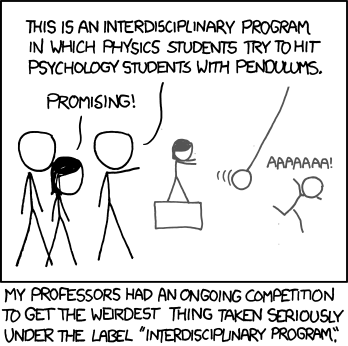Some thoughts on interdisciplinary
📬 Get the future posts directly in your inbox:
Lately, I have been thinking about interdisciplinary. During my academic and professional life, I have been working between borders of disciplines. I have moved through architecture, public policy, sociocultural studies, and recently network science (with application to urban studies). This path, at its best, is very entertaining, but sometimes it can feel as in the comic below.

For me, one of the most frustrating experiences is hearing over and over the common phrases like “Social sciences can benefit a lot from quantitative methods” or “we are building the physics of cities”. I agree that the research of social phenomena can benefit from quantitative and computational methods. However, I believe in the importance of recognizing the value of theories and methodologies that come from social sciences. Not because we have a hammer, we should treat every research problem as if it were a nail.
Social science theories and methods not only can motivate quantitative research. They have a long academic tradition that should not be ignored when working in interdisciplinary environments. Indeed, having at least a basic overview of the other(s) field(s) should be the minimum standard when engaging in interdisciplinary efforts. At least to not “re-discover” the same things.
Anyway, I still have some open questions in my head.
- Are the newly emerging interdisciplinary fields, such as computational social sciences, engaging in an equal discussion between disciplines? Or the contrary, are we building “social physics”, “psychics of cities”, and so on?
- Is the science we are doing interdisciplinary, or are we colonizing different fields just because we know how to use a hammer?
- How do we promote a two-way street when talking between disciplines?
I get it. To some social scientist maths are difficult, and for some quantitative persons reading long theories and studies might be challenging. But it shouldn’t. At least it shouldn’t be if we truly want to engage in interdisciplinary research.
I said that I don’t like to hear the same phrase over and over again “Social sciences can benefit a lot from quantitative methods”. If you work in an interdisciplinary field with a background in quantitative methods, how do you benefit from social sciences? What have you learned from them?
In my experience, I have been fortunate to have collaborators and mentors that engage in these discussions. We have created an equal floor to collaborate and bring our different expertise to build together. I benefit from their expertise in quantitative methodologies (among others), and they benefit from my expertise and knowledge in urban studies (If you are my collaborator and you are reading this, I hope you feel the same 😬).
📬 Get the blog posts directly in your inbox:
💬 Join the conversation:
Keep to conversation with a comment or reach out in my social networks.